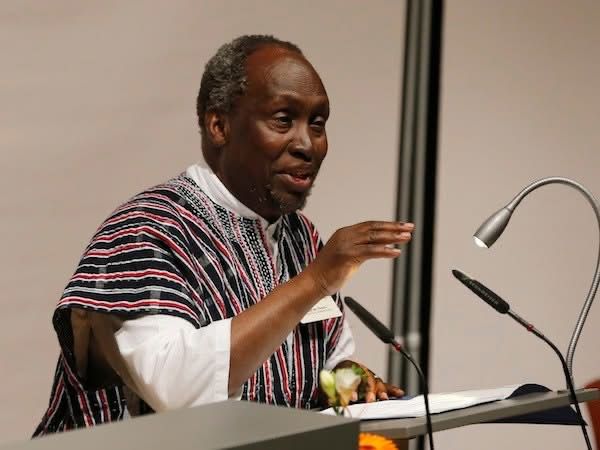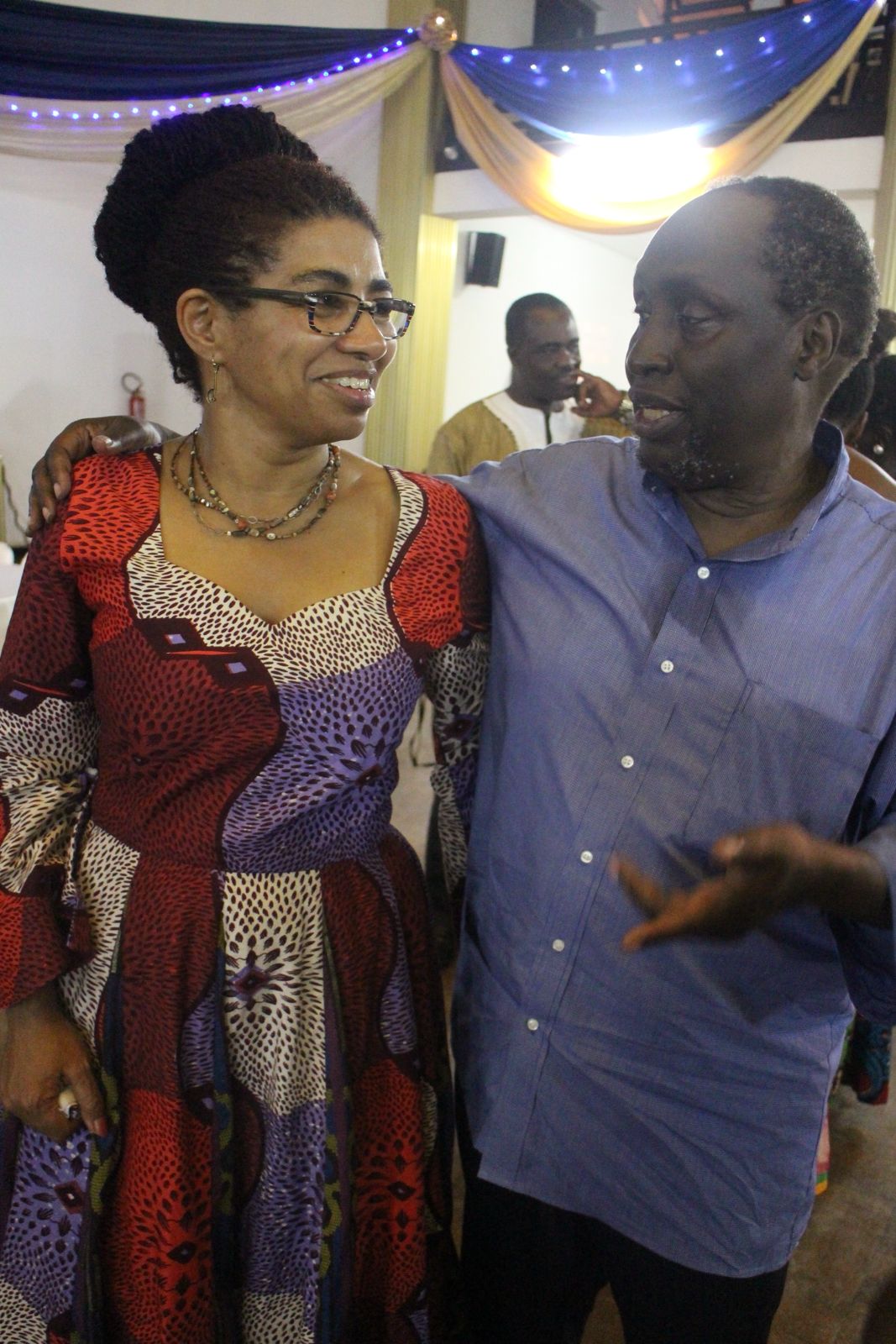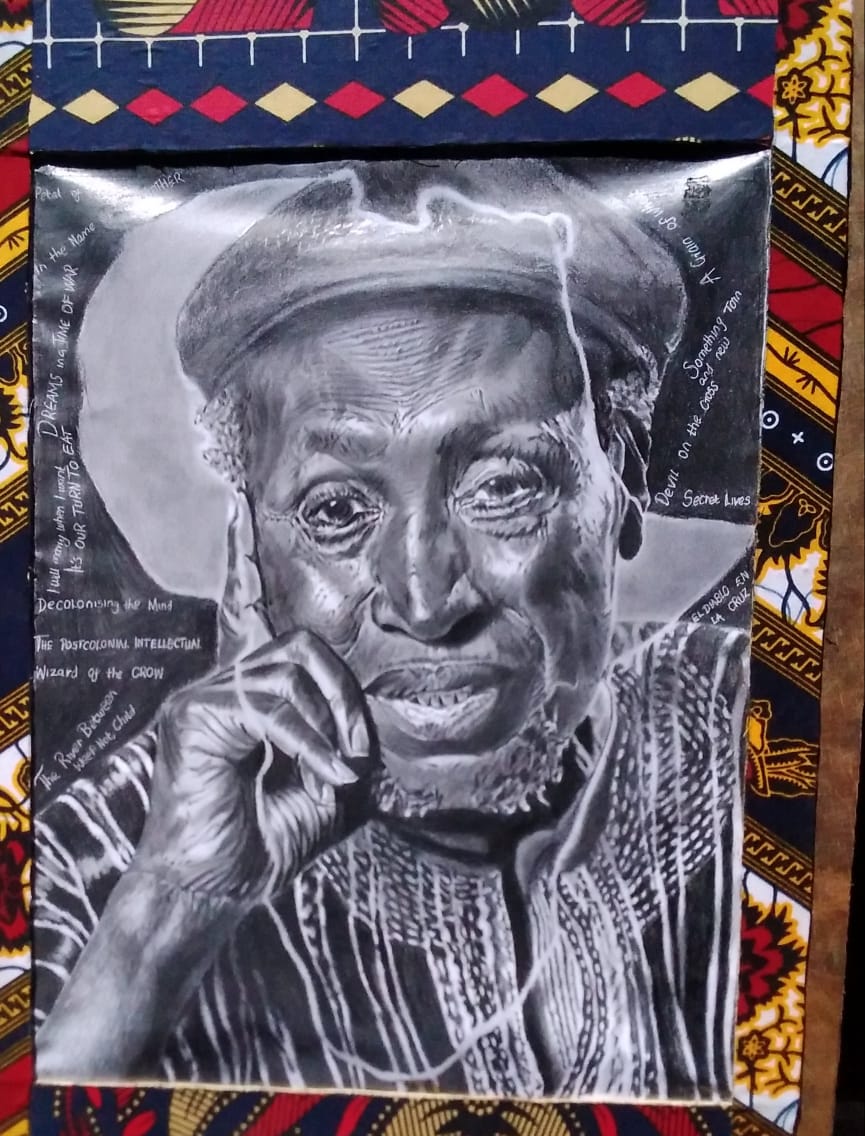News
Tribute to Ngũgĩ wa Thiong'o
25.06.2025

It is a call for the rediscovery of the real language of humankind: the language of struggle. […]
In struggle is our history, our language, our being.
That struggle begins wherever we are; in whatever we do: then we become part of those millions […]
sleeping not to dream but dreaming to change the world.
- Decolonising the Mind, 1986: 108.
The Gender and Diversity Office of the Africa Multiple Cluster pays tribute to a giant in African letters, an erudite decolonial thinker, ‘a storyteller who refused to be bound by exile and jail’1. Kenyan writer Ngũgĩ wa Thiong’o passed after a long illness in Buford, Georgia, USA on the morning of 28 May 2025. He is survived by his children, among them the authors, Mukoma wa Ngugi and Wanjiku wa Ngugi.
Mwalimu Ngugi is best known for his novels among them, Weep Not, Child (1964), The River Between (1965), A Grain of Wheat (1967), Petals of Blood (1977), Caitaani Mutharaba-ini (1980). Aside from these works, the author is also known for his memoirs e.g. Wrestling with the Devil: A Prison Memoir (2018), Birth of a Dreamweaver: A Memoir of a Writer’s Awakening (2016), In the House of the Interpreter: A Memoir (2012). Among the five plays he wrote, one stands out particularly in the GDO memory – The Trial of Dedan Kemathi (1976) co-authored with the late Micere Githae Mugo, who had held an ICDL Lecture in the Cluster’s Knowledge Lab on 9 June 2022. His short story collections include A Meeting in the Dark (1974), Secret Lives and Other Stories (1976, 1992), Minutes of Glory and Other Stories (2019).
Amongst his non-fictional writing, Mwalimu Ngugi’s Decolonising the Mind: The Politics of Language in African Literature (1986), Something Torn and New: An African Renaissance (2009), Globalectics: The Theory and Politics of Knowing (2012), Secure the Base: Making Africa Visible in the Globe (2016) are some examples of required reading in the spirit of Reconfiguring African Studies. Especially
Decolonising the Mind proffers important dimensions of knowledge production, which need to be considered closely in any serious engagement with non-Western epistemologies.
Ngugi wa Thiong’o was a champion of African literature written in African languages, even as he taught English Literature at the University of Nairobi, and serving as a Fellow in Creative Writing at Makerere University, and guest-lecturing at Northwestern University’s English and African Studies department. He held several notable academic appointments include:
- Visiting Professor of English and Comparative Literature at Yale University between 1989 and 1992.
- Holding the Erich Maria Remarque Chair as professor of Comparative Literature and Performance Studies at New York University in 1992
- Guest at the Congress of South African Writers and spent time in Zwide Township with Mzi Mahola
- Distinguished Professor of English and Comparative Literature
- First director of the International Center for Writing and Translation at the University of California, Irvine.
He received a number of awards, which include:
- 2016: Park Kyong-ni Prize
- 2016: Sanaa Theatre Awards/Lifetime Achievement Award in recognition of excellence in Kenyan Theatre, Kenya National Theatre
- 2017: Los Angeles Review of Books/UCR Creative Writing Lifetime Achievement Award
- 2018: Grand Prix des mécènes of the GPLA 2018, for his entire body of work
- 2019: Premi Internacional de Catalunya Award for his Advocacy for African languages
- 2019: Erich Maria Remarque Peace Prize
- 2021: Longlisted for the International Booker Prize for The Perfect Nine
- 2021: Elected a Royal Society of Literature International Writer
- 2021: EBRD Literature Prize
- 2022: PEN/Nabokov Award for Achievement in International Literature
Ngugi wa Thiong’o had been a preferred nominee for the Nobel Prize in Literature in 2010, but was not awarded the prize.
Mwalimu Ngugi had his own history with Bayreuth. He wrote the first chapters of Decolonising the Mind during a stint as visiting professor at the University of Bayreuth, with the Department of English and Comparative Literature, from 15 May to 15 July 1984. He returned to Bayreuth several times, and his latest visit took place in May 2014, when he became the first recipient of an honorary doctorate from the Bayreuth International Graduate School of African Studies.
He will be remembered and revered as an intellectual ancestor and a prominent shaper of African Studies.
There are many who have closer ties with Mwalimu Ngugi and the GDO is happy to hold space here for a few reflections shared by Afro-Feminist scholars affilaited with the Cluster, who honour his memory.
AKOSUA ADOMAKO AMPOFO, University of Ghana, Legon, Ghana

Photo © Akosua Adomako Ampofo
I come from the generation who were introduced to “African writers’ in secondary school, both formally (African literature) and socially, through Pan-African nurturing by our elders. Our English literature class introduced us to Chinua Achebe, Ngũgĩ wa Thiong'o (in the 1970s he was still James Ngugi) and Ayi Kwei Armah. Even though the stories were of struggle and survival during a period that for us felt like a long gone past - which when you think of it, it wasn’t really, being only about 2 decades removed from my then-reality - there was something nostalgic about these narratives. This was when I read Weep not Child, The River Between, A Grain of Wheat: independence struggles, Mau Mau Freedom Voters, Separated Lovers.
Many years later, 2013 to be precise, I had the opportunity, to meet Ngũgĩ for the first time in person; and what a pleasure that was. The link was my friend and colleague Cecelia Lynch, a professor at the University of California, Irvine, which had become Ngũgĩ’s home in the early 2000s I believe. The Institute of African Studies at the University of Ghana, where I was the Director at the time, was about to celebrate our 50th anniversary and we were looking for keynote speakers who could reflect on our Pan-African mandate, particularly for a younger audience. Our choices were Ngũgĩ wa Thiong'o, Fatou Sow, and Carlos Lopez. Being passionate about inter-generational dialogue I suggested we hold a conversation between Fatou, Ngũgĩ, high school students and some of our graduate students (Carlos could not make it to Accra on time to join us). It was one of the most fascinating inter-generational conversations, I had attended in a long time.
Ngũgĩ is a master storyteller, and his keynote - no surprise - about the politics and strategies around employing African languages and identity was a tour de force: refreshing, uplifting, strategic, thoughtful and humorous. At our closing dinner and awards ceremony, he was delightful, charming, and such a pleasure to be with.
Later, I bought two copies of the book Wizard of the Crow for my teenage/young adult daughters that Ngũgĩ signed. Now that he has gone home to join the ancestors, my younger daughter, now almost 29 wrote “he signed my book, and I read literally the best story I’ve read in my life”. Arguably she hasn’t lived that long a life, and her years of reading books is even shorter; however, she has read many, many books. Also, if a young adult reads a book that is over 700 pages long to the end - that says a lot! Absurd, humorous, satirical, fantastic; Wizard of the Crow is a trip!
Like many of his fellow humans, Ngũgĩ was a gifted, delightful but also complex person, warts and all. As one of his students, albeit more vicariously, I conclude by saying I feel blessed to have encountered his wit, talent, and ferocious commitment to African knowledge production. His works have contributed to my learning to write more creatively, clearly and vibrantly, and also to read more politically and sensitively. May he rest in peace as he joins the ancestors.
CATHERINE KIPROP, Moi University, Eldoret, Kenya
In Memoriam: Ngũgĩ wa Thiong’o – A Revolutionary Mind Has Rested
It is with solemn reverence that we mark the transition of Ngũgĩ wa Thiong’o, a towering figure in African literature, cultural criticism, and decolonial thought. His passing is not just the loss of a brilliant writer and academic—it is the moment when an intellectual ancestor, whose courage and conviction shaped generations, joins the realm of the revered.
Ngũgĩ’s legacy is immense, but none more enduring than his clarion call in Decolonising the Mind (1986), a seminal work that continues to ignite scholarly and political consciousness across Africa and the global South. In this radical text, Ngũgĩ dismantled the colonial entanglements of language, identity, and power, insisting that the struggle for liberation must begin with the mind.
“The bullet was the means of the physical subjugation. Language was the means of the spiritual subjugation.” — Decolonising the Mind, p.9
He exposed how colonial education alienated African children from their own cultures and selves, replacing indigenous languages with European tongues, and local histories with imperial myths. For Ngũgĩ, language was not merely a tool of communication—it was a carrier of culture, a vessel of memory, and a weapon of resistance.
“Language, any language, has a dual character: it is both a means of communication and a carrier of culture.” — Decolonising the Mind, p.13
Ngũgĩ chose to abandon writing in English—then the language of his greatest literary fame—and embraced his mother tongue, Gĩkũyũ, in an act of literary defiance and deep cultural affirmation. His prison memoir Detained and his novel Caitaani Mũtharaba-Inĩ (Devil on the Cross), first written on toilet paper while imprisoned without trial, are testaments to the cost of truth-telling and the courage to decolonize even under repression.
“I had made the decision to write in Gĩkũyũ. I knew I had to confront the system from within the linguistic terrain where the heaviest of battles was being fought: in the mind.” — Detained: A Writer's Prison Diary
As an educator, activist, and artist, Ngũgĩ challenged African intellectuals and institutions to confront Eurocentric paradigms and re-anchor their work in the soil of African epistemologies. His vision was not just academic—it was political, spiritual, and intergenerational.
Today, we mourn his earthly absence but celebrate the enduring presence of his ideas, stories, and struggle. Ngũgĩ wa Thiong’o did not just write books—he charted paths of liberation. He not only decolonized his own mind—he emboldened millions to do the same. May he journey well among the ancestors.
Rest in power, Ngũgĩ wa Thiong’o. Your words are seeds. Your legacy is a forest in bloom.
RAHAB NJERI, University of Cologne, Germany

Photo © Rahab Njeri
Today my heart is heavy beyond words. Our beloved Mwalimu Ngũgĩ wa Thiong’o. has transitioned. The world has lost a giant, a fierce warrior of words, truth and African dignity.
Evey Sunday like clockwork, the phone would ring – and there you were, with your voice full of life and laughter. You would sing old Gikuyu songs, fill the air with stories soaked in wisdom, and always ask how my children and my mother were doing. That simple consistent care – that was your qway. You carried generations with you, reminding us to remember who we are, where we come from, and where we must go. You were more than a teacher, You were a compass. A lighthouse. A revolutionary griot. Through your words, you gave us back our pride, and our power.
Together, we founded KAAAL – the Kemet Awards for Achievement in African Languages. It was a vision rooted in your life’s work – a space to honour African langauges and celebrate those committed to their revitalization. At KAAAL, we didn’t just celebrate you, Mwalimu – we celebrated your profound influence on millions across the world. You never missed a KAAAL conversation. You were always there, present with humility, joy and generosity, eager to share you deep well of knowledge and love. You showed us that language is liberation, and through KAAAL, we built a living legacy with you.
You were a father to many of us – children of the continent, of the diaspora, of the struggle, of the dream. You made space for us. You believed in is. You taught us that writing in our mother tongues is an act of defiance and love.
There is no Decolonising the Mind without Mwalimu Ngugi. You gave us the vocabulary and the vision. You made it clear that to reclaim ourselves, we must reclaim our tongues, our stories, our truths. We will carry your light forward. We will sing the songs. We will write the stories. We will speak the languages. We will teach the children.
You once told me „Language is not just communication – it is memory.“ Thank you, Mwalimu, for restoring our memory. Thank you for the love. The calls. The laughter. The courage.
Rest now, Mwalimu. Your legacy is rooted deep, and we will continue the work – in your name, in your spirit, in your song.
Lala salama. Mwathani akuhe thayu.

